Josephus on John the Baptist
What Josephus tells us about John the Baptizer and how it compares to the Bible
John the Baptist shows up in all four Gospels and the Jewish-Roman historian Flavius Josephus writes about him as well.
John is the prophet who popularized the locusts and wild honey diet (Mathew 3:4). Depending on the tradition, he’s also known as John the Immerser, John the Baptizer, and St. John the Forerunner.
The Gospels show him as the prophet who came before Jesus to prepare the way for His ministry.

Josephus has slightly different dates than the Bible, but nonetheless writes of events that correspond closely with the Gospel accounts. Including John’s imprisonment and death at the hands of Herod Antipas.
Let’s check out some of the things that the Gospel writer Luke records about John, and then we’ll move on to see what Josephus says.
[Or, if you’re more in a watching sort of mood, just check out this video ↓↓↓.]
John the Baptist in the Gospel of Luke
This is how Luke records the beginning of John’s ministry in the area around the Jordan River.
In the fifteenth year of the reign of Tiberius Caesar—when Pontius Pilate was governor of Judea, Herod tetrarch of Galilee, his brother Philip tetrarch of Iturea and Traconitis, and Lysanias tetrarch of Abilene— 2 during the high-priesthood of Annas and Caiaphas, the word of God came to John son of Zechariah in the wilderness. 3 He went into all the country around the Jordan, preaching a baptism of repentance for the forgiveness of sins. [Source, Luke 3: 1 - 3 NIV]
Luke records that John made a major impact on the people around him. Such an impact that they wondered if he was actually the Messiah.
15 The people were waiting expectantly and were all wondering in their hearts if John might possibly be the Messiah. 16 John answered them all, “I baptize you with water. But one who is more powerful than I will come, the straps of whose sandals I am not worthy to untie. He will baptize you with the Holy Spirit and fire. 17 His winnowing fork is in his hand to clear his threshing floor and to gather the wheat into his barn, but he will burn up the chaff with unquenchable fire.” [Source, Luke 3: 15 - 17 NIV]
Later, Jesus does arrive on the scene. John recognizes Jesus as the Son of God and baptizes him.
Many scholars recognize that site as Al-Maghtas (meaning “immersion”) in modern day Jordan. You can see it on the map, to the east of the Monastery of St. John in the Wilderness, close to where John is believed to have been born.
His role as forerunner to Christ thus fulfilled, John is shortly afterwards thrown into prison by Herod Antipas.
Antipas had often been the subject of John’s preaching, and not in a complimentary way. Antipas was one of the sons of Herod the Great. Herod the Great was the Herod who had been king when Jesus was born. (And he later suffers a pretty miserable death, according to Josephus.)
Here’s what Luke tells us about John and Herod Antipas:
But when John rebuked Herod the tetrarch because of his marriage to Herodias, his brother’s wife, and all the other evil things he had done, 20 Herod added this to them all: He locked John up in prison. [Source, Luke 3: 19 - 20 NIV]
Luke tells us that Herodias was the wife of the brother of Herod Antipas. That brother was yet another Herod, Herod Phillip.
Fun Fact: Why so many Herods? The name Herod can mean the male sovereign of a kingdom.
You can see the kingdoms of both Herod Antipas and Herod Phillip on the map below. Note that at this time in the story, the territory of Archelaus show in pink (yes, he’s yet another son of Herod the Great) had been reconstituted as the Roman province of Judea after his death.

John, preaching a message of righteousness and repentance, did not approve of a marriage in which one brother takes another brother’s wife. He gets arrested after publicly expressing his disapproval. Herod Antipas locks him in the hilltop palace fortress of Machaerus, on the eastern side of the Dead Sea.
This is the same place where he will be executed. You can see Machaerus on the map above at the southern end of the territory of Herod Antipas.
And this is where the ruins of Machaerus are today, in western Jordan.
We learn that Machaerus is the place of John’s imprisonment from Josephus, who corroborates much of the Gospel account.
The Writing of Josephus
Josephus writes of John the Baptist in the 20-volume Antiquities of the Jews, which he finished in 94 AD.
John the Baptist features in Book 18. It’s here that we learn about Herod Antipas and Herodias, John coming into conflict with Herod, and how Herod eventually has John put to death.
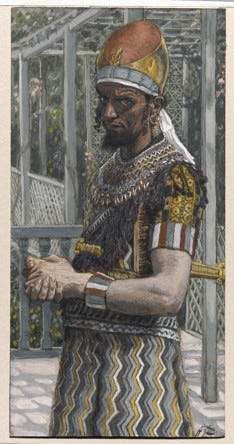
Josephus on John the Baptist
In telling the full story of John the Baptist, Josephus introduces us to King Aretas IV Philopatris. Aretas was the king of the neighboring Nabataen Kingdom who had conflict with Herod Antipas.
One source of the conflict was the planned marriage of Herodias and Antipas.
At the time, Antipas was already married to the daughter of Aretas (Phasaelis). Whom he divorces in order to marry Herodias.

Aretas was head of the Nabataean Kingdom from 9 BC until 40 AD. The kingdom was home to the famous city of Petra and bordered the territory of Antipas to the east.

This is what Josephus records:
About this time Aretas (the king of Arabian Petra) and Herod (Antipas) had a quarrel, on the account following: Herod the Tetrarch had married the daughter of Aretas, and had lived with her a great while; but when he was once at Rome, he lodged with Herod (Philip), who was his brother indeed, but not by the same mother; for this Herod was the son of the high priest Simon’s daughter.
However, he fell in love with Herodias, this last Herod’s wife, who was the daughter of Aristobulus their brother, and the sister of Agrippa the Great. This man ventured to talk to her about a marriage between them; which address when she admitted, and agreement was made for her to change her habitation, and come to him as soon as he should return from Rome; one article of this marriage also was this, that he should divorce Aretas’s daughter. So Antipas, when he had made this agreement, sailed to Rome; but when he had done there the business he went about, and was returned again, his wife having discovered the agreement he had made with Herodias, and having learned it before he had notice of her knowledge of the whole design, she desired him to sent her to Macherus, which is a place on the borders of the dominions of Aretas and Herod, without informing him of any of her intentions.
Accordingly Herod sent her thither, as thinking his wife had not perceived anything; now she had sent a good while before to Macherus, which was subject to her father, and so all things necessary for her journey were made ready for her by the general of Aretas’s army and by that means she soon came into Arabia, under the conduct of the several generals, who carried her from one to another successively; and she soon came to her father, and told him of Herod’s intentions. So Aretas made this the first occasion of his enmity between him and Herod, who had also some quarrel with him about their limits at the country of Gamalitis. So they raised armies on both sides, and prepared for war, and sent their generals to fight instead of themselves; and, when they had joined battle, all Herod’s army was destroyed by the treachery of some fugitives, who, though they were of the tetrarchy of Philip, joined with Aretas’s army. [Source, Josephus, Antiquities, Book 18]
Josephus continues writing, and this is where he tells us about John the Baptist:
Now some of the Jews thought that the destruction of Herod’s army came from God: and that very justly, as a punishment of what he did against John, that was called the baptist. For Herod slew him; who was a good man, and commanded the Jews to exercise virtue; both as to righteousness towards one another, and piety towards God; and so to come to baptism. For that the washing would be acceptable to him, if they made use of it, not in order to the putting away of some sins [only,] but for the purification of the body: supposing still that the soul was thoroughly purified beforehand by righteousness. Now when others came in crowds about him; for they were very greatly moved by hearing his words; Herod, who feared lest the great influence John had over the people might put it into his power and inclination to raise rebellion: (for they seemed ready to do any thing he should advise:) thought it best, by putting him to death, to prevent any mischief he might cause; and not bring himself into difficulties by sparing a man who might make him repent of it when it would be too late. Accordingly he was sent a prisoner, out of Herod’s suspicious temper, to Macherus; the castle I before mentioned; and was there put to death. Now the Jews had an opinion, that the destruction of this army was sent as a punishment upon Herod; and a mark of God’s displeasure to him. [Source, Josephus, Antiquities, Book 18]
This is what the ruins of Machaerus look like today.
This is the account in the Gospel of Mathew, where Herod Antipas hears of Jesus and first believes the miracle worker to be John the Baptist, whom he had previously killed.
At that time Herod the tetrarch heard the reports about Jesus, 2 and he said to his attendants, “This is John the Baptist; he has risen from the dead! That is why miraculous powers are at work in him.”
3 Now Herod had arrested John and bound him and put him in prison because of Herodias, his brother Philip’s wife, 4 for John had been saying to him: “It is not lawful for you to have her.” [Source, Mathew 14: 1 - 4, NIV]
Similarities and Differences in the Gospel Accounts vs. Josephus on John the Baptizer
The writings of Josephus corroborate much of what the Gospels tell us about John.
John was a prophet who called the Jews to repentance
John was known for his ministry of baptism
John and Herod Antipas came into conflict over John’s message
Herod Antipas puts John in prison (Josephus adds the detail that this imprisonment was at Machaerus)
John is executed upon the orders of Herod Antipas (the Gospel accounts add the story of how it is Herodias who manipulates Antipas into this)

The Beheading of John the Baptist, Caravaggio
In terms of the content of the story, the primary difference is that Josephus emphasizes the political angle of the conflict between John and Herod Antipas.
In Antiquities, Antipas fears the influence that John has with the people and worries he might start a rebellion. In the Gospel accounts, Antipas is primarily upset about what John is saying to the people regarding his marriage to Herodias.
Both, of course, can be true. It is not hard to imagine that John preached against the immorality of Antipas, of which his marriage to his brother’s wife was a chief example. And Antipas both feared the influence of those words on the people, while also being personally angry at being called to repentance by a rabble rousing preacher.
He was right to worry that John would incite a rebellion. But it wasn’t the kind of earthly rebellion he had worried about.
Instead, John helped to pave the way for the Jesus of Nazareth, who claimed to be the kind of king who would lay down his life for others.
Next week: The much disputed account of what Josephus wrote about Jesus.





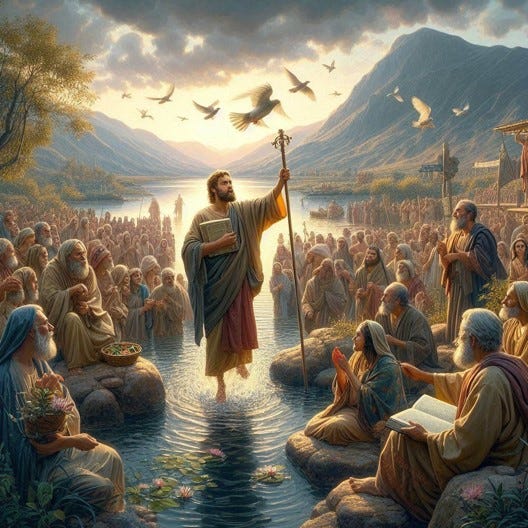




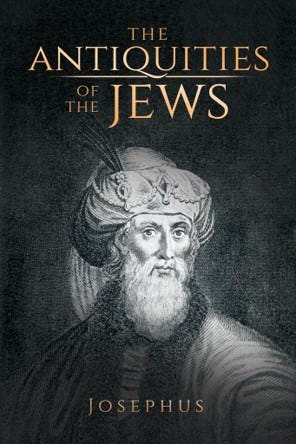
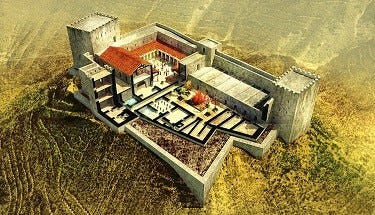
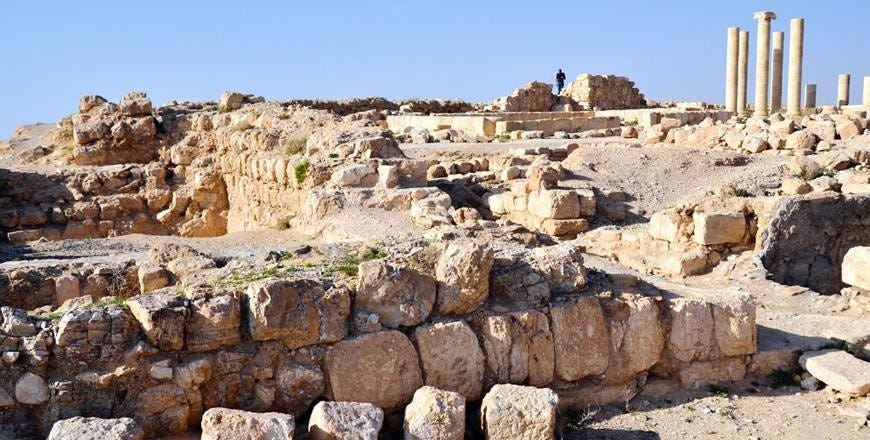

It’s cool to see those historical accounts line up so closely. Also looking forward to seeing what he said about Jesus!
Interesting stuff, Zack. You're saving me from having to read all 20 volumes of Josephus...